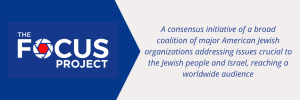
![]()
BACKGROUND – TALKING POINTS – ACTIONS – HOSTAGE UPDATE
![]()

“Whoever listens to a witness, becomes a witness. It is all about memory. The survivor’s duty is to bear witness for the dead and for the living. To forget the dead would be akin to killing them a second time.” – Holocaust survivor, author and Nobel Peace Prize laureate, Elie Wiesel.
The 80th anniversary of the liberation of Auschwitz – the death camp where the Nazis murdered 1 million of the 6 million Jews exterminated in the Holocaust – is a somber reminder of what happens when societies allow hateful words and attacks to go unchallenged. Memories of that horror are fading as Holocaust survivors pass away.
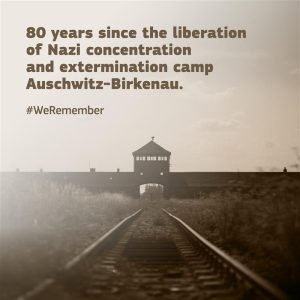
Survivor Testimonies: ‘Hatred of Jews led to the Holocaust’
“Hunger, horrible winters, savage beatings, seven sharing a bunk and lice were not the worst conditions at Auschwitz. Humiliation was the worst. Because we were Jewish, we were treated like cockroaches. What do people do with cockroaches? They step on, they crush, they suffocate, they kill, they annihilate.” – Marian Turski, Holocaust survivor
Marian Turski survived the largest death march of the Holocaust – the Nazis forced 56,000 individuals at Auschwitz to walk 35 miles in harsh winter conditions. A death march was a forced evacuation under brutal conditions, resulting in mass deaths from starvation, exhaustion and violence. Marian watched as 15,000 others perished in the winter weather. The UN marked the liberation of Auschwitz on January 27, 1945, as International Holocaust Remembrance Day. The 98-year-old Polish historian addressed world leaders at the gates of Auschwitz: “Now, we see a huge rise in antisemitism (anti-Jewish hatred) and it is precisely antisemitism that led to the Holocaust.”
Auschwitz was one of six Nazi death camps specifically designed to exterminate Jews who were gassed to death and their bodies burned in industrial ovens. Of the more than 6 million who were killed, at least a million were shot to death – the Holocaust by Bullets – and buried in mass graves throughout eastern Europe.
Only 50 Auschwitz survivors attended this year’s ceremony at Auschwitz – most remaining survivors are in their 90s. Britain’s King Charles headlined world leaders joining this year’s remembrance event. For the first time, leaders did not speak. Instead they listened to survivor testimonies. There are growing concerns that after all survivors pass away, the Holocaust will become forgotten history – especially among younger generations who know the least about one of history’s greatest tragedies.
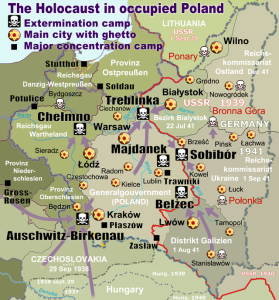
Alarming Worldwide Rise in Attacks Against Jews
The Holocaust began with words and escalated into anti-Jewish laws, dehumanization and government-directed attacks against Jewish civilians in Germany and other European countries in the 1930s.
Today, anti-Jewish incidents in France are at a “historic” high. Assaults on Jews walking in New York City, the firebombing of synagogues in Australia, harassment of Jewish university students around the world and anti-Jewish incitement on social media are only a few of the escalating attacks against Jews around the world. They demonstrate a somber reminder for Jews of the perilous nature of their lives. Oct. 7, 2023 – the deadliest attack against Jews since the Holocaust – serves as a painful reminder.
Holocaust survivor Moshe Ridler narrowly escaped death after a Ukrainian couple found him nearly frozen following a successful escape. Two of his relatives died from a 186-mile death march during the Holocaust. Moshe moved to Israel in 1951 where he investigated sexual predators, thieves and drug dealers as a Tel Aviv cop. He survived the Holocaust but not the resurgence of hate. Iran-backed Hamas terrorists murdered him in his kibbutz home on 10/7.
Anti-Israel students at the Univ. of Pennsylvania applauded a speaker that stated, “Jews go back to f**king Berlin where you came from.” Neo-Nazi vandals desecrated a synagogue in Slovenia: “Jews are the evil of the world,” and, “Death to the Jews, Glory to Slovenia.” Terrorists torched a Jewish childcare center and spray painted anti-Jewish graffiti, including, “F**k Jews,” in Australia, a few days after attackers targeted the previous home of a Jewish leader. StandWithUs Australia launched a nationwide campaign to combat rising antisemitism: Defend the Truth, Empower the Future.
Israel’s Prime Minister Netanyahu: “I call on all civilized nations to confront antisemitism wherever it appears – on college campuses, city streets or international forums like the International Criminal Court.” Israel’s President Herzog echoed his sentiments: “The UN, ICC and International Court of Justice time and again exhibited moral bankruptcy, allowing antisemitic genocidal doctrines to flourish uninterrupted in the wake of the largest massacre of Jews since World War II.” Pope Francis urged for the eradication of anti-Jewish hatred and stated that the horror of the Holocaust must never be forgotten.
Surveys Warn That More Education is Needed to Combat Hate
Students and professionals are falling for anti-Jewish conspiracy theories at an alarming rate. Some students on campuses repeat Hamas slogans that are similar to Nazi propaganda. A new study by an international organization, the Claims Conference on Jewish Material Claims Against Germany, found that 56% do not know that 6 million Jews were killed, 21% think it was less than 2 million and 48% cannot name a single concentration camp or ghetto. In the weeks following the 10/7 atrocities, 76% of Americans agreed that “another mass genocide against the Jewish people could happen again today.”
The ADL Global 100: Index of Antisemitism found 46% of the world’s adult population – about 2.2 billion – hold deeply entrenched anti-Jewish attitudes, more than double the number compared to its survey a decade ago. The numbers are even worse among younger adults – and the most educated. Even countries deemed the least antisemitic have been rocked by major incidents, including the recent “Jew hunts” in the Netherlands. The World Zionist Organization recorded a 340% surge in the past two years – including a 288% increase in anti-Jewish incidents in America and a 562% increase in Canada. The WZO noted that “Zionism” is often used as a cover to discriminate against Jews.
The increasing number of Jews sharing their stories of being attacked underscores new studies and statistics about the threats Jews are facing in countless countries. The 10/7 massacre opened the floodgates of hate against Jews, especially among younger generations. An educational organization, Echoes & Reflections, revealed that Holocaust education is essential, but it is not enough to curb antisemitism alone – students also must learn about contemporary antisemitism.
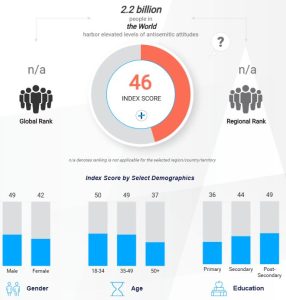
![]()

![]()

A. Watch survivor testimonies: Survivor testimonies are powerful tools for understanding the Holocaust and preserving its memory. By listening to the voices of those who endured unimaginable suffering, we gain insight into their resilience and humanity. These testimonies not only educate but inspire action, ensuring that the lessons of the Holocaust are never forgotten.
B. Holocaust denial and distortion must be confronted: Speak up!: Everyone can educate themselves about Holocaust denial and distortion. When you see or hear anyone spewing anti-Jewish vile relating to the Holocaust, let your voice be heard – both in person and online. Call out lies and call upon allies to unite against anti-Jewish bigotry. The Combat Antisemitism Movement has a platform to report hateful content on social media sites. Also check out the ADL’s REPAIR Plan: Fighting Hate in the Digital World.
C. Urge businesses, organizations and governments to adopt the IHRA definition of antisemitism: Consider petitioning your company, volunteer organization, school district, local elected officials or state government to adopt the IHRA working definition of antisemitism. Adoption does not stop antisemitism but it will help provide an educational framework for deterring future cases of anti-Jewish bias and discrimination. The Louis D. Brandeis Center For Human Rights Under Law webinar on Antisemitism in the Workplace provides best practices for companies that want to combat hatred against Jews, and the IHRA website offers a Toolkit Against Holocaust Distortion for policymakers and teachers.
D. Ensure your local school district adopts and teaches a Holocaust curriculum: Does your child’s public school district or private school have a Holocaust education requirement? Many states and districts have an annual educational program that often includes testimony from a local Holocaust survivor. The first step is to confirm if your child’s school has guidelines in place for teaching about the Holocaust. The second step is to ensure that this vital education is taught at a high standard.
![]()
Hamas Released Three Israeli Hostages, Breached Ceasefire Agreement
Iran-backed Hamas terrorists released three female Israeli soldiers it kidnapped in their pajamas during the 10/7 attacks. The blood-stained sweatpants of Naama Levy – who volunteered at the United Nations, Red Cross and Hands for Peace that brought Palestinians and Israelis together – were an enduring image of the horrors of that evil day. Naama was released with Daniella Gilboa, Liri Albag and Karina Ariev. Agam Berger remains in captivity, but is expected to be released among the next group. The hostages suffered severe physical and psychological trauma, including cooking for their captors while being starved.
This was the second exchange of captive Israelis for imprisoned Palestinians. Hamas agreed to release female Israeli civilians first, including Arbel Yehoud. Arbel remains held by Iran-backed Palestinian Islamic Jihad terrorists. Hamas blamed a communications issue with PIJ, but PIJ terrorists stood with Hamas terrorists during the hostage release. In response to this agreement breach, Israel delayed allowing Palestinians to return to their homes in northern Gaza. Many in the news media reported on the Israeli delay before explaining why the action was taken.
Hamas also had agreed to provide a list of the individual status of the hostages to be released in the first stage – whether they are dead or alive. After a delay, Hamas only provided the number who are still alive. Israeli leaders are increasingly concerned over the condition of the Bibas family. Shiri Bibas and her then nine-month-old and two-year-old red-headed sons became endearing images of the brutality of Hamas terrorists. There were reports that the family was killed in Gaza, but Hamas had stated more than a year ago that Daniella Gilboa was dead and now she has been released alive, providing some hope for the families of other hostages.
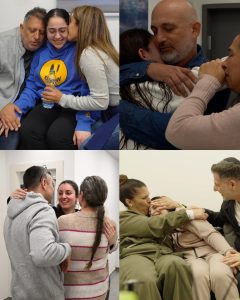
Released Hostages Upstage Hamas Propaganda Stunt
Hamas terrorists continue to distribute propaganda in attempts to project strength. The terrorist group set up a stage in the Gaza City square where it was set to hand the hostages over to the Red Cross. A banner in the background proclaimed victory. Hamas terrorists suddenly appeared in military uniforms after fighting against Israeli soldiers largely in civilian clothes. They also drove what appeared to be brand new SUVs and trucks.
The terrorists dressed the four young Israeli women in olive-colored clothes hoping the world would forget the images of how they looked when they were abducted. Some journalists erroneously reported that they were wearing IDF uniforms. The hostages were given gift bags, including a certificate of captivity. The four women defiantly raised their hands in victory, smiled and refused to speak as requested by Hamas, before being rushed off stage and into Red Cross vans for their heartwarming reunions with their families.

Murderous Thugs Welcomed Home by Palestinian President and Civilians
The release of the four Israeli soldiers came at a heavy cost, including the release of 121 Palestinians serving life sentences for murdering Israelis. Palestinian Authority President Mahmoud Abbas – Israel’s supposed peace partner – called Yasser Abu Bakr to congratulate him on his release. Bakr is a terrorist affiliated with the terrorist wing of the president’s political party was sentenced to 115 years in prison for murdering three Israelis – including a nine-month-old baby. Palestinian civilians in Gaza and the West Bank again proudly welcomed home the recently released prisoners. Abbas met for an hour with another convicted killer in 2018. A politician saluted that terrorist as a “leader and a hero.”
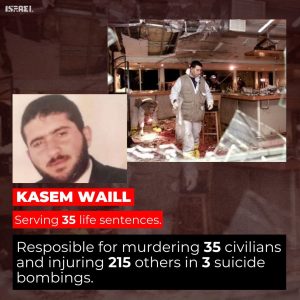
![]()
In light of the surge of current relevant news, please subscribe to our Daily News Brief, a digest of critical news headlines curated from thousands of media addressing issues that affect the Jewish world.
![]()

This content is developed by The Focus Project in partnership with MERCAZ USA. The Focus Project distributes weekly news and talking points on timely issues concerning Israel and the Jewish people, including antisemitism, anti-Zionism and the delegitimization of Israel. It represents a consensus view across a spectrum of major American Jewish organizations. MERCAZ USA recognizes and respects the diversity of views on these issues among its readers and the community at large.
![]()